Porcelain is a type of ceramic material that is made from fine-particle clay known as kaolin and mixed with other materials such as feldspar and quartz. High-quality porcelain is generally translucent which gives it an elegant and refined appearance. Porcelain is also water-proof due to its vitrified structure. However, porcelain is brittle and will crack if subject to sudden impact or uneven pressure.
Criteria for Selection
Selecting the best glue for porcelain requires defining the key criteria to ensure durability, performance, and ease of application. Porcelain is a delicate and perhaps fragile material that requires an adhesive suited to its properties. Below we define a comprehensive set of criteria for selecting the best adhesive for porcelain:
1. Adhesive Type
Adhesives come in all shapes and sizes. Therefore, you need to be familiar with the different types of adhesives to ensure you select the appropriate one for the job.
Epoxy Adhesives: Epoxy glues are best for creating strong, durable bonds. They are two-part adhesives consisting of resin and a hardener. This type of adhesive is especially suited for applications requiring fixing broken pieces of porcelain.
Cyanoacrylate: This is a type of super glue that provides a quick strong bond. It works well for minor repairs but lacks durability. Therefore, if you are using large porcelain pieces than you should opt for an epoxy solution.
Polyurethane Glue: This versatile and durable bonding agent is made from polyurethane, a type of polymer known for its flexibility and resistance. It is good for joining dissimilar materials such as plastic to ceramic or glass to metal. It is also a waterproof material.
Silicone Adhesives: Ideal for non-load bearing applications and where flexibility is needed.
2. Bond Strength
It is important to choose an adhesive that matches your requirements for strength and durability. Epoxy adhesives are renowned for their bonding strength and are suitable for porcelain exposed to daily use or minor impact.
3. Drying and Curing Time
Cyanoacrylate adhesives are fast-setting and are suitable for quick fixes. However, they do not allow for precision alignment because it is harder to readjust given the drying speed. If precision alignment is a concern, consider a slow-setting adhesive such as epoxy or polyurethane.
4. Compatibility with Porcelain
Not all glues bond effectively with porcelain. That’s why it’s important to check the label to ensure compatibility with porcelain. Ideally, the adhesive must be designed for non-porous surfaces.
5. Resistance to Environmental Factors
Porcelain can be exposed to environmental conditions which is why the adhesive must have resistance to heat, water, moisture, and UV light.
6. Application Ease
Thicker adhesives with higher viscosity help with precision and prevent runs on vertical surfaces. On the other hand, thinner adhesives can penetrate cracks more easily.
Some adhesives require the use of tubes syringes or applicator bottles, so consider this because it may take skill to use them. Additionally, you want to opt for an adhesive that is easy to clean up after application.
7. Color and Finish
Porcelain has a glossy, smooth finish and repair should be as discreet as possible. Transparent or color-matching adhesives are ideal for maintaining a professional and clean finish. Epoxies can be tinted to blend seamlessly with the porcelain’s color.
8. Durability and Longevity
Epoxy-based adhesives generally provide the most durable solutions, especially for items subjected to frequent use or mechanical stress.
9. Cost and Availability
If you are on a budget or require less adhesive, then you should opt for a smaller container.
5 Best Glues for Porcelain
Now that we have defined the criteria for selecting the best glue for porcelain, we will list out 5 recommendations that fit the requirements.
Gorilla Epoxy
Gorilla Epoxy is a two-part adhesive that consists of a resin and a hardener to create a durable bond. It is suitable for porcelain because of its strong adhesion, waterproof properties, and clear finish upon curing. It produces a strong durable bond and can fill minor gaps or uneven surfaces. It also provides a clean finish.
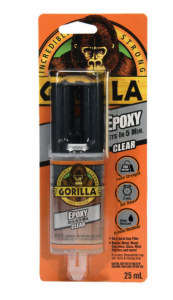
| Pros | Cons |
|
|
Application: This product is ideal for fixing broken porcelain items like vases, dishes, and figurines. It can also handle stress-bearing applications such as handles.
Loctite Super Glue (Gel Control)
Loctite Super Glue Gel Control is a cyanoacrylate adhesive designed for quick and precise repairs. Its gel formula is made specifically for small porcelain cracks and chips.
This adhesive bonds within seconds making it efficient for small repairs. The gel formula also prevents dripping and allows for precise application.
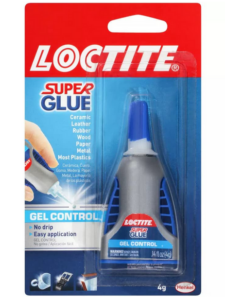
| Pros | Cons |
|
|
Application: It is good for lightweight applications and small repairs but does not suffice for heavy-duty bonding.
J-B Weld ClearWeld
J-B Weld ClearWeld is another two-part epoxy adhesive that is known for its clear finish and strong bonding. It is a versatile adhesive for delicate materials like porcelain.
This adhesive dries clear for an invisible finish. It has a high tensile strength of 3900 PSI which ensures long-term durability. Additionally, it sets in 5 minutes which allows some time for readjustments. It will also bond to dissimilar materials such as ceramic, metal, wood, and more.
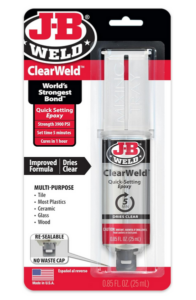
| Pros | Cons |
|
|
Application: Suitable for repairing porcelain kitchenware, and structural pieces like tiles and fixtures.
Devcon Home 2-Ton Epoxy
The Devcon Home 2-Ton Epoxy is a high-strength, two-part adhesive designed for long-lasting bonds. It can handle heavy loads and stress which makes it ideal for repairing functional porcelain parts.
The adhesive has a tensile strength of 2500 PSI and it performs well in challenging environments such as exposure to heat or chemical resistance. It is also versatile and bonds with dissimilar materials like porcelain, glass, ceramic, and more.
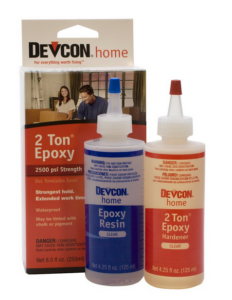
| Pros | Cons |
|
|
Application: The Devcon 2-Ton Epoxy is suitable for repairing porcelain fixtures, handles, or items subject to weight and stress. It can also bond dissimilar materials.
E6000 Craft Adhesive
This adhesive is a versatile, industrial-strength glue that works effectively on porcelain. It is flexible, durable, and capable of bonding to a wide range of materials such as ceramics, glass, metal, and more.
The E6000 Craft Adhesive is fully waterproof, so it is suitable for applications such as kitchen tiles. It retains flexibility after curing, mitigating the risk of brittle failure. Additionally, it produces a tough long-lasting bond that can withstand extreme temperatures and UV exposure.
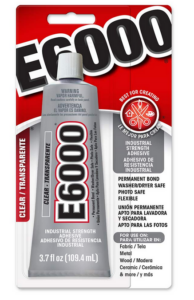
| Pros | Cons |
|
|
Application: Good for porcelain tiles and items that may be exposed to varying temperatures or weather conditions.
Conclusion
This wraps up our recommendations for the best glue for porcelain. Porcelain can be a delicate material but if you have the right adhesive, you can produce a viable outcome for your job. If you have any questions and if you feel you were guided in the right direction, please let us know in the comments below.